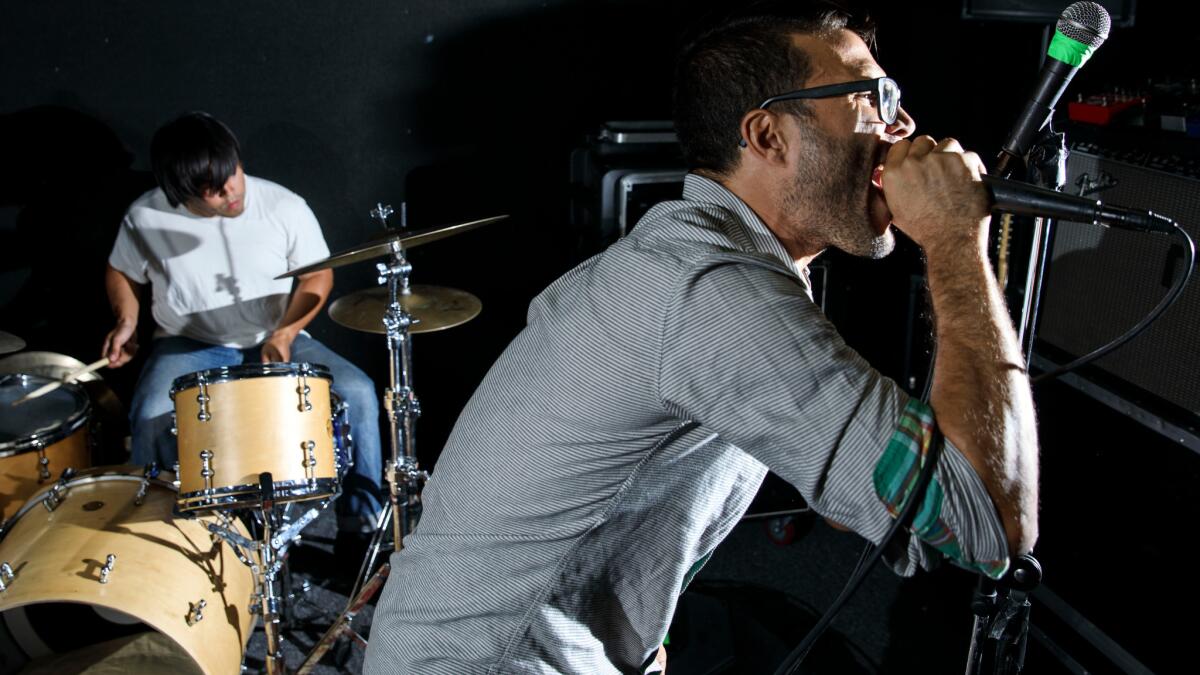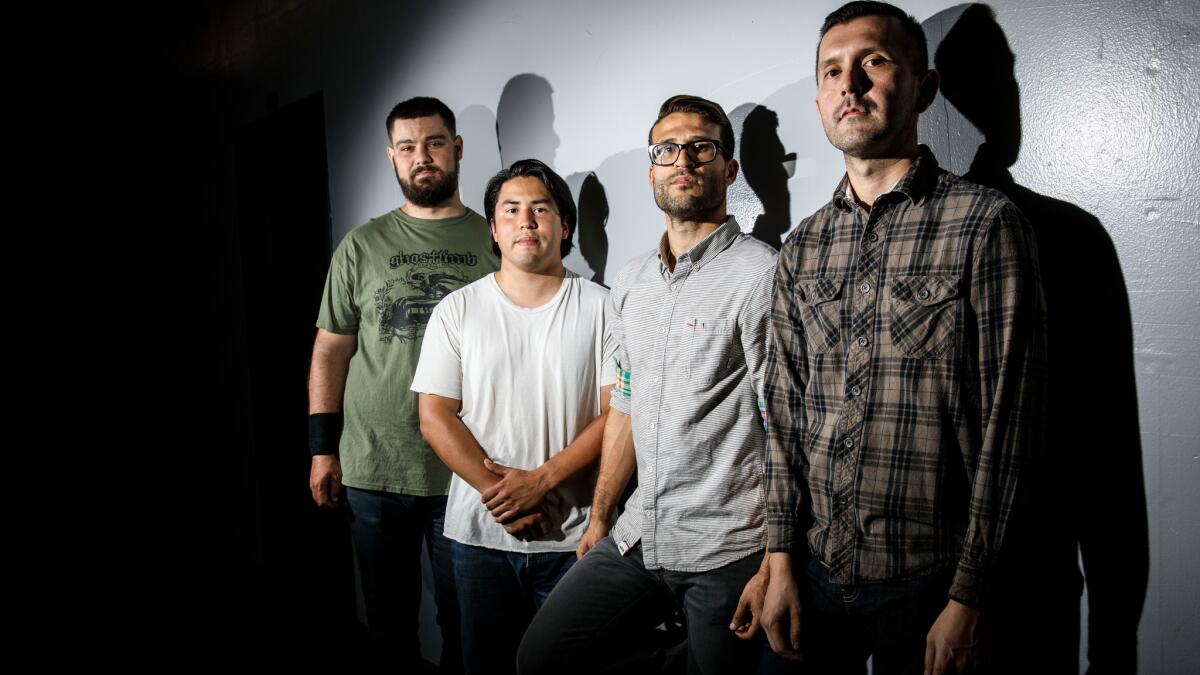L.A. hard-core band Dangers forces you to pay attention

- Share via
Inside a windowless warehouse in industrial Vernon, Alfred Brown IV got repeatedly punched in the face.
Spittle dripped from his mouth, and his jaw crunched under the hail of fists. Someone in Doc Martens boots kicked his head to the ground and stepped on his skull, grinding Brown’s face into the floor. To finish him off, the assailants picked him up, shirtless and heaving, and threw his body into a pile atop a stained mattress.
“That was great,” Brown said, a little dazed, catching his breath and picking himself up from the floor. “Now I want the girls to come up front and get really violent with this one.”
Brown’s punk band Dangers was shooting a music video for its new single, “Kiss With Spit,” and the band had invited a few dozen friends to beat him to a pulp on camera. In the thick of all that sweat and screaming, however, one of L.A.’s best-kept-secrets tried to find some meaning in the violence.
The quartet’s new LP, “The Bend in the Break,” is defiantly political and of the moment. Its songs stare down Eric Garner’s 2014 killing in New York City and racialized police brutality. There are several songs about sexual consent and guilt over men’s more uncaring impulses.
Overall, there’s a creeping sense that climate change and right-wing nationalism mean punk’s “no future” mantra is coming true.
But over 13 tracks of hard-swinging riffs and lung-collapsing howls, the recently released “Bend” makes such thorny questions feel as personal as a boot in the face.
Dangers has been a staple on the L.A. DIY hard-core scene for a decade, with varying lineups centered on Brown’s sinewy, Iggy Pop presence.
But given the new urgency of conversations about systemic racism and sexual assault, few bands are better positioned to work it out on record.
Brown, 33 is finishing his doctorate in literature and teaching English at USC (apparently, his is a popular class: His students’ reviews on RateMyProfessor.com include “The worst part about Al is that you can’t focus the first couple of weeks because he’s so hot” and “He’s easy on the eyes but he ain’t easy on your papers.”)
Guitarist Justin Smith and bassist Chris Conde are teachers as well, and while Dangers’ music is a release from buttoned-up academe, wrestling with identity is crucial to its music.
“I have a strange relationship to race because a lot of people don’t know I’m half-black,” Brown said (he also has Spanish and Portuguese roots; Conde and drummer Anthony Rivera are Latino, Smith is white).
“In grad school, race is always there, people are always talking about it and how to re-examine the canon,” he added. “But I always seem to bow out of these conversations. I mean, my half brother is an LAPD officer and my dad is super Republican and black. The whole record is about liminal spaces, and for me, I feel I’m in that space as well.”

“Loose Cigarettes” finds sad resonance in the goods Garner sold before his death: “Black lung. Black life. / The black hole stuck inside my half-black, heavy heart.”
On “Darkest Arts,” Brown shrieks invectives like “Half-breed mulatto faux pas” to startle the crowd, before grasping at empathy: “I’m not the skin that I’m stuck crawling within. I’m both the lynched and the mob.”
Similarly, in “It’s the Devil I Love,” the band evokes — and castigates — a culture that encourages men’s worst impulses around women: “No matter how much you pray, no matter how much you hide / there’s a dorm, there’s a church full of American boys drunk on American thighs.”
“I have two nieces that to me are the only pure things in my life. We didn’t know if these lyrics were things we should put on the record,” Brown said. “But it’s an honest experience, starting to realize some of the behaviors I’ve engaged in, that I wouldn’t want someone to treat them that way. I know how many times I’ve been hurt, but I know that probably means I’ve hurt other people just as much.”
By confronting pain caused and received, “Bend” doesn’t fit into punk orthodoxy.
Peers like the trans-fronted band G.L.O.S.S. used radical identity activism as the basis of their group; on the other end, Dangers’ friends Touche Amore wrote a whole album about their singer’s mother dying of cancer. “Bend” exists in a murky space between the political and the private.
“Instead of getting on a soapbox, they get you involved through the storytelling. It’s smart, but it’s catchy as hell,” said Jack Shirley, who produced “Bend” at his Atomic Garden studio in Palo Alto. “There’s such an over-saturation of people making music today and it’s hard to wade through it all, but they do what they do in such a unique way that they force you to pay attention.”
That extends to the music. Rivera’s drumming has an atypical jazzy looseness (the band cites Dave Brubeck as an occasional inspiration), and Smith’s guitar riffs are inventively savage. They tracked the album together with few overdubs, and “Bend” captures the bloodletting of its live sets.
But in a time when the music industry has left almost everyone a DIY act by default, how does a band like this grow, while keeping its very-old-fashioned underground ethics?
Dangers has toured the globe, but hosted its record release show at the All-Star Lanes bowling alley in Eagle Rock. The act’s heart and soul is in-house shows and all-ages underground spaces. Acts like No Age and HEALTH have come out of DIY rooms to more mainstream success. But Dangers has mixed feelings about aspiring to that.
You can just watch the video on YouTube the next day instead. And I think that’s particularly damaging to this style of music.”
— Justin Smith
“What I really like is the magic of being there, touching the band and sharing the stage with them,” Smith said. “It’s a festival culture now, and as I’ve seen it, there are a lot less people going out to shows generally. You can just watch the video on YouTube the next day instead. And I think that’s particularly damaging to this style of music.”
Back at the Vernon warehouse, Brown paused the beat-down for a few minutes as he proposed a new scene. Everyone had to take their clothes off and thrash him on the floor — something between an orgy and a mauling.
Everyone giggled, but they all complied. “I want everybody touching,” Brown said, gulping from the bottom of the sweaty, hairy pile of his friends. “For this one, your hands should always be on somebody. No one gets separated.”
For breaking music news, follow @augustbrown on Twitter.
ALSO:
The Smell’s future looks a little brighter after artists, fans rally to save the all-ages club
‘It’s pretty fun to hate people’: What Jeff Tweedy says about making Wilco’s most unsettling album
The Regrettes may be high-school age, but the band’s worldview is all grown up
More to Read
The biggest entertainment stories
Get our big stories about Hollywood, film, television, music, arts, culture and more right in your inbox as soon as they publish.
You may occasionally receive promotional content from the Los Angeles Times.









